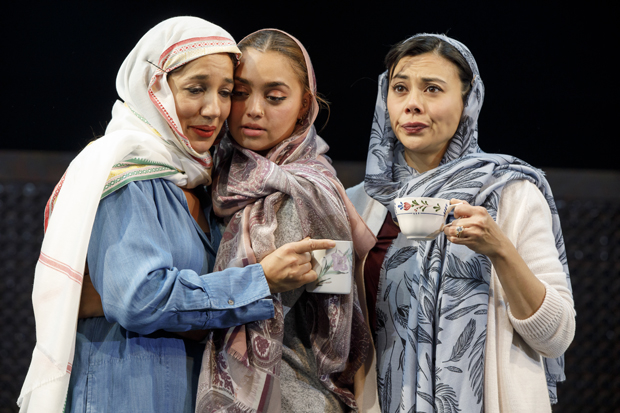A Langar Feast Is Served With India Pale Ale at Manhattan Theatre Club

(© Joan Marcus)
Boz Batra (Shazi Raja) is as Midwestern as cheese curds at a Packers game. She was born and raised in Raymond, Wisconsin — as were her brothers — as were her parents. That doesn't stop a white dude named Tim (Nate Miller) from walking into her all-American bar and asking "Where are you from?" Or "Where are your parents from?" Or, least graceful of all, "What are you?" There's no malice behind any of it — just the same oblivion that's kept him ignorant of the fact that the "I" in his cherished IPA stands for India. "A teachable moment," Tim chuckles after finally crash landing the plane of this awkward conversation. "My life is a series of teachable moments," Boz, a Punjabi-American sighs in reply (aware that at least a few audience members are sharing Tim's lightbulb moment). She's none too thrilled, which makes it all the more puzzling why Jaclyn Backhaus would craft a play that has more "teachable moments" than genuine ones.
India Pale Ale is on a mission to educate— whether it be about the Sikh tradition of Langar (a free vegetarian meal open to people of all castes and creeds) or the many Punjabi-American communities that you may or may not know are scattered across the country. To that end, there's an anxiety behind each of these moments, as if Backhaus and director Will Davis were personally checking in on the audience with an unspoken, "Did you get that?" Perhaps it's a side effect of our current political dystopia — an impulse to perform ethical triage. But whatever the reason, this urgency to moralize only keeps us at arm's length from the family with which we're supposed to be breaking down barriers.
Time is measured in Langar feasts, but the events that unfold both during and between the feasts neither support each other nor carry their own tension. The initial conflict centers around Boz, a 29-going-on-the-dreaded-30 single woman, who plans to defy conservative Indian tradition and move an hour away from home to Madison to open her own bar. The project makes her feel a kinship to her pirate ancestor Brownbeard, who pillaged beer from East India Company trading ships, while also merging with the spirit of American independence and entrepreneurship. The trip from Raymond to Madison isn't exactly a 17th-century voyage from Amsterdam to Calcutta, but as she digs up the "treasure" left by her late brother (who died under unclear circumstances in India) to bring on her journey, it leads Boz to fantasies of pirate ships and choppy seas nonetheless (scenic designer Neil Patel and costume designer Arnulfo Maldonado get to indulge their theatricality in these moments with glowing trap doors and hyperbolic pirate costumes).
Raja is a compelling performer, giving Boz a sturdy presence that is capable of maneuvering a storm with power and grace. And yet, her move to Madison — where she meets the aforementioned generic white male Tim (Miller maximizing the comedy of his role) — ends up being somewhat of a non-event. A dramatic thrust doesn't return until an act of violence at her family's Langar hall brings her back to Raymond (and leaves Tim of all people with the keys to her bar).
You feel Backhaus hint at the friction between Americanization and Punjabi tradition, and then immediately withdraw as if to avoid the implication that those two things are in any way incompatible. Her mother, Deepa (Purva Bedi), would prefer Boz stay close to home but acknowledges her need for freedom as an American girl — a freedom Deepa tells us her sister JJ (who we never meet) seized, thus leaving her estranged from her Punjabi community. Boz's dopey brother Iggy (Sathya Sridharan) meanwhile hues closer to tradition and is engaged to Lovi (Lipica Shah), a girl from his childhood community — an option it seems was also open to Boz and her ex-boyfriend Vishal (Nik Sadnani), but that one or both of them rejected. Neither choice is celebrated or condemned, as should be the practice of humans negotiating the world of varying cultures and family structures. But if everyone in your play is already that evolved, there're not much of a play left to write.










